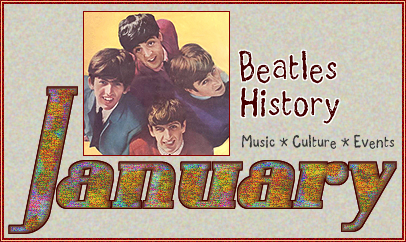 History offers History offers
a chance
to truly
understand
how the past
impacts the now.
Follow our
daily timelime
of historical
events to
discover the
role The Beatles
played in changing
the modern world.
THE FOLLOWING EVENTS TOOK PLACE ON JANUARY 28
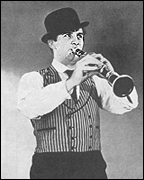 1807--London's Pall Mall is the first street to be lit by gaslight. 1807--London's Pall Mall is the first street to be lit by gaslight.
1929--Acker Bilk, clarinetist whose big hit was Stranger on the Shore, is born Bernard Bilk in Pensford, England.
1956--Elvis Presley makes his an appearance on "Tommy and Jimmy Dorsey's Stage Show." It's the first of four weekly slots for the rising star, who earns $1,250 per show. He performs Shake Rattle & Roll, Flip Flop & Fly and I Got a Woman, leaving comedian and the show’s producer, Jackie Gleason, to remark, "He can't last. I tell you flatly, he can't last."
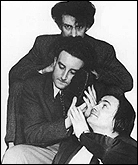 1960--"The Goon Show" broadcasts its final episode on the BBC. 1960--"The Goon Show" broadcasts its final episode on the BBC.
1961--The Beatles perform at Lathom Hall, Seaforth, Liverpool, and at Aintree Institute, Aintree, Liverpool.
1962--The Beatles perform at the Casbah Coffee Club, West Derby, Liverpool.
1963--The Beatles perform at the Majestic Ballroom, Newcastle-upon-Tyne, Northumberland.
1963--The Rolling Stones record five tracks with producer Glyn Johns in their efforts to interest a label in signing the group.
1964--On a rare day off for The Beatles during their three-week engagement at the Olympia Theatre in Paris, John Lennon and George Harrison fly back to London for a few hours.
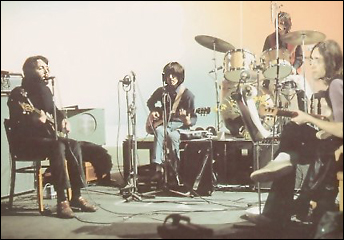 1969--The Beatles (with Billy Preston) in the recording studio (Apple Studios, London). Recording the songs for the next Beatles single, Get Back and Don't Let Me Down. A re-make of Love Me Do (and a rather wretched one at that) is also recorded, as is One After 909. A couple of Billy Preston demos are also recorded. Towards the end of the session, The Beatles' taped conversation shows that things aren't going very well; they discuss whether they should be recording or merely rehearsing, whether they should be filming or not, and even whether they should bother with the project any longer. Ringo is due to begin filming for the movie "The Magic Christian" in just a few days, so the situation seems to be hopelessly muddled. Unbeknownst to the other Beatles, the reason for John’s late arrival to the day’s recording session was because he and Yoko had met Allen Klein for the first time at London's Dorchester Hotel. Despite his awareness of Klein’s unscrupulous reputation (firsthand knowledge which he picked up from the manager’s previous clients, The Rolling Stones), before long, John will hire Klein to handle his business and financial affairs. 1969--The Beatles (with Billy Preston) in the recording studio (Apple Studios, London). Recording the songs for the next Beatles single, Get Back and Don't Let Me Down. A re-make of Love Me Do (and a rather wretched one at that) is also recorded, as is One After 909. A couple of Billy Preston demos are also recorded. Towards the end of the session, The Beatles' taped conversation shows that things aren't going very well; they discuss whether they should be recording or merely rehearsing, whether they should be filming or not, and even whether they should bother with the project any longer. Ringo is due to begin filming for the movie "The Magic Christian" in just a few days, so the situation seems to be hopelessly muddled. Unbeknownst to the other Beatles, the reason for John’s late arrival to the day’s recording session was because he and Yoko had met Allen Klein for the first time at London's Dorchester Hotel. Despite his awareness of Klein’s unscrupulous reputation (firsthand knowledge which he picked up from the manager’s previous clients, The Rolling Stones), before long, John will hire Klein to handle his business and financial affairs.
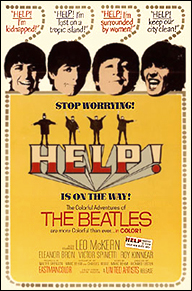 1970--John Lennon's "Bag One" exhibit of lithographs at the London Arts Gallery comes to its scheduled close, with only six of the original 14 lithographs still on the walls (Scotland Yard had confiscated the other eight on January 16; those lithographs had been judged to be "potentially pornographic"). 1970--John Lennon's "Bag One" exhibit of lithographs at the London Arts Gallery comes to its scheduled close, with only six of the original 14 lithographs still on the walls (Scotland Yard had confiscated the other eight on January 16; those lithographs had been judged to be "potentially pornographic").
1972--The triple album The Concert For Bangladesh went to No.1 on the UK album chart. The concert had been organised by George Harrison to raise funds for the people caught up in the war and famine from the area.
1983--Billy Fury dies of heart failure at age 42.
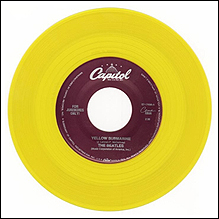 1987--In America, The Beatles’ 1965 film "Help!" is released on video and laser disc. 1987--In America, The Beatles’ 1965 film "Help!" is released on video and laser disc.
1991--The BBC announces that it is refusing to play the new version of Give Peace A Chance by The Peace Choir (Sean Lennon and others). It claims it is because of their new policy of not playing anti-war material.
1994--US re-release of The Beatles' vinyl singles labeled "For Jukeboxes Only": Hey Jude / Revolution (blue vinyl); Birthday / Taxman (green vinyl); A Hard Day's Night / Things We Said Today (white vinyl); Something / Come Together (blue vinyl); and Sgt. Pepper's Lonely Hearts Club Band / A Day in the Life (clear vinyl). All released by Capitol / CEMA.
For more day-by-day history go to HistoryUnlimited.net
|
 History offers
History offers


